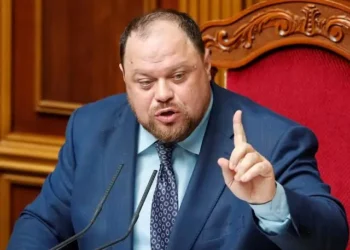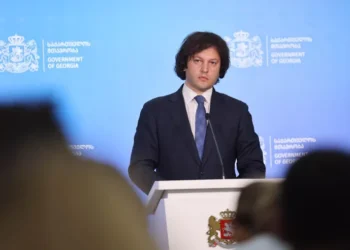Senior Associate Research Fellow at the International Center for Policy Studies in Kyiv, Ukraine, and a Senior Policy Analyst in the ‘Europe in the World’ Program at the EPC, Amanda Paul is an expert on issues related to security and conflict resolution in the Black Sea region, Russian foreign policy in the former Soviet space, EU enlargement, and foreign policy in its Eastern neighborhood. It was only natural, then, for Radio Free Europe/RL’s Georgian Service to approach her with some questions following the European Commission’s momentous decision this week to recommend Georgia for EU candidacy status.
How much reason do we have to hope that the EC recommendation will be followed through and the country will get candidate status?
I think there’s a good chance of achieving that. The European Council usually follows the recommendations of the Commission, so I do believe there’s a good chance that Georgia will be given the candidate country status, but of course, between now and then, there are still several weeks. And as was indicated in the report, there’s still many things that Georgia needs to do. So we shouldn’t lose time. It’s good to celebrate, but we need to see the momentum from the government to continue pushing ahead with the reforms. This will send a very strong signal ahead of the council meeting. So don’t take the foot off the accelerator, put your foot down even more strongly and crack on with the reforms!
President Von der Leyen underscored the European aspirations of the majority of Georgian people and noted the government should reflect those aspirations. Who actually got this recommendation? Georgians as a people, or the government?
Honestly, we should first and foremost say a big thanks to the Georgian population. The Georgians are amazing. They’ve always stood behind the goal of EU membership, and also NATO membership. And they have gone out onto the streets to protest for it. They have a very loud voice, Georgians, they do, and they’re not afraid to speak out. And the government have of course done something, but they could have done more, much more, because the Georgian government is very capable of very quickly meeting all of the criteria. To be honest, they did something in the last five minutes, which is very Georgian, in a way. So what I would like to see now is a really big push from this government to get this over the line, and to bring this candidate country status home for Georgia and the people, because they really, really deserve it.
When you say that the government was able to do much more, but they didn’t, what exactly could have been done, and why didn’t they do it, do you think?
They could have done things quicker. A few weeks ago, much less had been done than today. I mean, Georgia does have a track record of doing things at the last minute, but this problem didn’t need to be a problem. They could have carried these reforms through a year ago. People say it’s because the Georgian government is pro-Russian. It’s difficult to believe that all of the Georgian government is pro-Russian. I mean, this goes against the DNA of Georgia. But for whatever the reason they had, they made a lot of mistakes over the last year or so. Georgia can’t afford to make any more mistakes. They need to do the work now and deliver, because this is a once in a lifetime opportunity.
We could never have imagined that Georgia would receive candidate country status one and a half years ago. Let’s not lose the opportunity. We’re at a very unique geopolitical watershed moment, and this applies to the South Caucasus too. I mean, Georgia doesn’t have a border with the EU, it’s on the other side of the sea, but that doesn’t mean that this neighborhood is any less important than the direct neighborhood. There is a big question mark as to what will happen if Georgia doesn’t receive it, if we don’t take this step, not just for Georgia and the Georgian people, but for the South Caucasus as a whole, for the EU’s influence as an actor in the region. All of these things are being taken into consideration.
Georgia is a European country. For me, this is not even a question. It may not share a border with the EU, but it’s a European country. Georgians are European, it’s in their DNA, it’s in their hearts, it’s in their minds. So I think all of these issues were taken into consideration when the Commission made this recommendation. Now, the Council, the 27 EU Member States, need to be smart enough to actually give Georgia candidate country status.
9 conditions, some new, some remaining from the previous 12 – how much depends on fulfilling those before the December decision?
I think it’s important that we see an immediate effort to fulfill these criteria, particularly some of the big ones – the deoligarchization, judicial reform. Depolarization is still a huge issue in Georgia. And it’s one of the issues you can’t just blame on Georgian Dream. This is also the responsibility of the main opposition party, the UNM. They also need to be responsible and take steps to help depolarize politics in Georgia, because it’s very toxic, to put it mildly. They all need to crack on with the reforms and deliver what the Georgian people deserve.
Deoligarchization was already featured in the 12 conditions, and it’s still there in the nine new ones we’ve been given. But now Brussels says “structural de-oligarchization.” What exactly needs to be done in layman’s terms?
Notably, this deoligarchization doesn’t just apply to Georgia- it’s also still an issue for Ukraine and Moldova. So we should remember that. Basically, Georgia needs to follow the recommendations of the Venice Commission when it comes to the deoligarchization, as it has a sort of roadmap on what needs to be done. But once again, it’s something that all three candidates have struggled to effectively do. In fact, Georgia’s history with oligarchs is much less powerful than either Ukraine’s or Moldova’s, so it should be easier, if anything’s easy in this life.
And what would that mean for oligarchs in Georgia?
It means the oligarchs should have no place in political life, in the government, or influencing any policies or whatnot. We’ve seen a similar situation in Ukraine, where oligarchs were presidents of the country, such as Poroshenko, and he wasn’t the only oligarch with an influence on politics. They can’t have a role of any sort in the political life of the country.
And how realistic do you think it is to expect that to happen in Georgia? Do you expect the oligarchs to wash their hands of it and no longer be involved?
That’s up to the government. It requires political will to do it. It’s not straightforward, that’s the short answer. And I don’t imagine that the change will happen overnight. But we need to keep the eye on the prize here. So in the long term, it’s in Georgia’s interest to show the necessary political will. It is in the government’s interest as well.
The governments’ or the country’s?
Let me put it this way: The government says it wants European integration, that it is a priority; it says that it really wants to be an EU candidate country, wants to start accession negotiations and is ready to take steps to achieve this. Therefore, they need to show the political will, to transform words into concrete action, and to do it properly. It’s not easy, but it’s doable.
Polarization remains a challenge, has been for more than a decade now. It’s safe to assume what couldn’t be achieved in the last 12 years won’t be achieved in the month and half remaining. So where do we stand?
It takes two to tango, right? And as you mentioned, it’s not going to happen in the next month or so. But still, there should be some signals given from both sides that they’re ready to do it for the sake of the country. I mean, at the end of the day, both the government and the opposition say that they want to be a member of the EU, that it’s Georgia’s long term priority. So each side needs to take a step back and make some efforts in this direction. Otherwise, nobody will win and they’ll just find themselves damaging the country.
And if those steps are not taken, then one can surmise that whoever doesn’t take the necessary step hasn’t been truthful about it being their number one priority, right?
Absolutely. If it’s the top priority for both the government and opposition, then they both need to take the necessary steps. I mean, one can’t do it alone. They both need to do it.
The European Commission recommended starting accession talks with Ukraine and Moldova this year. If you were to put a timeframe on it, how long do you think this process will take?
I would say at least a decade, because there’s no fast track into the EU. Probably for Moldova, it will be quicker than Ukraine, because it’s a small mouthful, right? Ukraine is a big country. And the process will take time. And it also depends not just on the candidates, but on the EU, because in parallel, the EU needs to actually to carry out internal reforms. And these things need to happen simultaneously. I mean, the EU needs to get fit for enlargement and the candidates need to get fit to join. So the both of them have work to do.
Will there be a date for Georgia as well, if it is given candidate status?
I would imagine that once Georgia actually achieves candidate country status, then the EU could potentially talk about the need for opening accession negotiations. I just feel incredibly happy that Georgia has this opportunity, probably not as happy as you are, as a Georgian, because it’s something that we could never have imagined before. I’m just sorry that it took a war to actually wake up the EU, to have them understand the necessity of integrating these countries.
Better late than never.
Yes. It’s for European security and stability. These countries need to be in, not out, and certainly not in a gray zone.
Interview by Vazha Tavberidze














